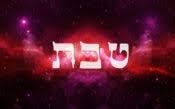- Main Page
- Torah Readings
- Holiday & Monthly commentary from Min. Garrett
- Weekly drash from Jonathan
- Weekly parashah commentary from Min. Garrett
- Contact Us
- Membership
- Mission and Vision Statements
- Statements of Belief
- Books
- Articles by Min. Garrett
- Other Ministries
- Music Links
- Morning Prayers
- CAP/USAF News
- Jewish Calendar and Jewish History
Skip to content

Bible teachers usually interpret the tearing of the Temple veil as a sign of God’s displeasure with the people and the Temple, but according to Hebrews 10:19-20, the veil symbolizes the Messiah’s body. He is the veil. As the life was rent from His body, the curtain was rent with the result that we might have access to the throne of glory in the supernal Temple through Him. This is not the same as abrogating the Temple worship system; rather, the rending of the veil vividly dramatized what the death of Messiah accomplished for us: access to God through the Messiah’s suffering.
Embroidered upon the veil were two cherubim. The cherubim invoke the imagery of the Garden of Eden and the way to the tree of life, as it says in Genesis 3:24, “And at the east of the garden of Eden He stationed the cherubim and the flaming sword which turned every direction to guard the way to the tree of life.” The cherubim on the veil stood sentry in front of the holy of holies like the two cherubim that guard the way to the tree of life (immortality) and the Garden of Eden (paradise). As the curtain was rent into two pieces, the tear created a path between the two cherubim, symbolizing the way back to Eden.
David Daube interprets the tearing of the veil as an expression of God’s sorrow. Rending garments is a Jewish mourning rite. When Elisha saw his teacher Elijah depart, he “took hold of his own clothes and tore them in two pieces” (2 Kings 2:12). Some manuscripts of Mark 15:38 make an allusion to 2 Kings 2:12 explicit by reading, “the veil of the temple was torn in two pieces.”
The sages commented on the story of Elisha rending his garments and enumerated several tragedies for which one should rend his garments into two pieces and leave them forever after un-mended. They include the death of one’s father or mother, the death of one’s teacher, the burning of a Torah scroll, and the destruction of the Temple or Jerusalem.
The Talmud also states that if one witnesses someone “breathe his last,” he must rend his garments:

Posts in Category: First Fruits of Zion
Terumah and Shabbat Zachor
On February 20, 2021 0 Comments
- First Fruits of Zion
TORAH PORTION for Shabbat: February 20, 2021
- Terumah (תרומה | Heave offering)
- Torah: Exodus 25:1-27:19
- Haftarah: 1 Kings 5:26-6:13
- Gospel: Mark 12:35-44
* Special readings for Shabbat Zachor are applicable this Shabbat.
- Shabbat Zachor (זכור | Remember)
- * Maftir: Deuteronomy 25:17-19
- * Haftarah: 1 Samuel 15:1-34
- Gospel: Mark 6:14-29

Rending of the Veil, by William Bell Scott, 1869 (Image: Wikimedia Commons Public Domain/Gallerix.org)
The Tearing of the Veil
You shall hang up the veil under the clasps, and shall bring in the ark of the testimony there within the veil; and the veil shall serve for you as a partition between the holy place and the holy of holies. (Exodus 26:33)God commanded that a veil should be made to separate the holy of holies from the holy place. According to the Gospels, the veil tore into two pieces when Yeshua breathed His last upon the cross: “And the veil of the temple was torn in two from top to bottom” (Mark 15:38).
Bible teachers usually interpret the tearing of the Temple veil as a sign of God’s displeasure with the people and the Temple, but according to Hebrews 10:19-20, the veil symbolizes the Messiah’s body. He is the veil. As the life was rent from His body, the curtain was rent with the result that we might have access to the throne of glory in the supernal Temple through Him. This is not the same as abrogating the Temple worship system; rather, the rending of the veil vividly dramatized what the death of Messiah accomplished for us: access to God through the Messiah’s suffering.
Embroidered upon the veil were two cherubim. The cherubim invoke the imagery of the Garden of Eden and the way to the tree of life, as it says in Genesis 3:24, “And at the east of the garden of Eden He stationed the cherubim and the flaming sword which turned every direction to guard the way to the tree of life.” The cherubim on the veil stood sentry in front of the holy of holies like the two cherubim that guard the way to the tree of life (immortality) and the Garden of Eden (paradise). As the curtain was rent into two pieces, the tear created a path between the two cherubim, symbolizing the way back to Eden.
David Daube interprets the tearing of the veil as an expression of God’s sorrow. Rending garments is a Jewish mourning rite. When Elisha saw his teacher Elijah depart, he “took hold of his own clothes and tore them in two pieces” (2 Kings 2:12). Some manuscripts of Mark 15:38 make an allusion to 2 Kings 2:12 explicit by reading, “the veil of the temple was torn in two pieces.”
The sages commented on the story of Elisha rending his garments and enumerated several tragedies for which one should rend his garments into two pieces and leave them forever after un-mended. They include the death of one’s father or mother, the death of one’s teacher, the burning of a Torah scroll, and the destruction of the Temple or Jerusalem.
The Talmud also states that if one witnesses someone “breathe his last,” he must rend his garments:
Rabbi Shimon ben Eleazar says, “One who stands near the dying, at the time when he breathes his last, he is duty bound to rend his garments.” (b.Bava Meitza 25a)The Gospel of Mark delivers the same sequence in the same type of language: “He breathed His last, and the veil of the temple was torn in two from top to bottom” (Mark 15:37-38). The Temple curtain can be likened to the garment of God:
If it were not written in the Scripture [Lamentations 2:17], no one would dare to utter it: “The LORD has done what He purposed, which He commanded from days of old; He has rent His purple garment.” (Pesikta Rabbati 27:2)
Return to Torah Readings
Mishpatim
On February 13, 2021 0 Comments
- First Fruits of Zion
TORAH PORTION for Shabbat: February 13, 2021
- Mishpatim (משפטים | Judgments)
- Torah: Exodus 21:1-24:18
- Haftarah: Jeremiah 34:8-22, 33:25-26
- Gospel: Matthew 26:20-30
The Grace vs. Law Concept
This week’s Torah portion contains a lot of laws. Exodus 21-23 reads like an ancient legal code. Of the 613 commandments that the sages traditionally derive from the Torah, more than fifty of them are found in this week’s portion.
For some reason, many Christian teachers seem to view the laws of the Torah as if they are a bad thing. It is commonly taught that the law is the opposite of grace. You might hear someone say, “We are no longer under the law. We are under grace.” The implication is that since we have received the Messiah, we need not concern ourselves with the laws in the Old Testament. We can call this idea “Grace vs. Law.”
Let’s think about the Grace vs. Law idea. What do we mean when we say that we are not under the law? Does that mean we do not have to keep God’s rules? For example, does it mean that we can commit adultery and theft? Of course not. No one would say that. So what does it mean?
The Grace vs. Law concept is derived from the writings of Paul. In his epistles, it seems that Paul pits the two in opposition to each other. He often says things like “Before faith came, we were kept in custody under the law” (Galatians 3:23) and “If you are led by the Spirit, you are not under the Law” (Galatians 5:18). One might misunderstand these statements to mean that Christians do not need to keep God’s rules. Of course, that would be absurd. Paul realized that some people might misunderstand his teaching, so he cautioned us not to suppose that grace gives us free license to sin against God:
The Bible does not actually teach the idea of Grace vs. Law. Grace is God’s free gift of salvation for those who believe in His Son. Law is His loving instruction for how His people should live. Grace vs. Law is a false dichotomy. They are not opposed to each other. They are meant to work hand in hand.
For some reason, many Christian teachers seem to view the laws of the Torah as if they are a bad thing. It is commonly taught that the law is the opposite of grace. You might hear someone say, “We are no longer under the law. We are under grace.” The implication is that since we have received the Messiah, we need not concern ourselves with the laws in the Old Testament. We can call this idea “Grace vs. Law.”
Let’s think about the Grace vs. Law idea. What do we mean when we say that we are not under the law? Does that mean we do not have to keep God’s rules? For example, does it mean that we can commit adultery and theft? Of course not. No one would say that. So what does it mean?
The Grace vs. Law concept is derived from the writings of Paul. In his epistles, it seems that Paul pits the two in opposition to each other. He often says things like “Before faith came, we were kept in custody under the law” (Galatians 3:23) and “If you are led by the Spirit, you are not under the Law” (Galatians 5:18). One might misunderstand these statements to mean that Christians do not need to keep God’s rules. Of course, that would be absurd. Paul realized that some people might misunderstand his teaching, so he cautioned us not to suppose that grace gives us free license to sin against God:
What shall we say then? Are we to continue in sin so that grace may increase? May it never be! How shall we who died to sin still live in it? (Romans 6:1-2)If Paul was not teaching believers that they did not have to keep God’s rules, what was he talking about? In Paul’s day, many of the Jewish believers taught that before Gentiles could be part of the kingdom of heaven, they needed to become Jewish. The idea that a Gentile must become Jewish before being saved is what Paul calls being “under the law.” Paul believed that Gentiles became sons of Abraham and part of the people of God through faith in Messiah. They did not need to earn that status by becoming legally Jewish. They did not need to first come “under the law” in order to enter the kingdom.
Do we then nullify the Law through faith? May it never be! On the contrary, we establish the Law. (Romans 3:31)
The Bible does not actually teach the idea of Grace vs. Law. Grace is God’s free gift of salvation for those who believe in His Son. Law is His loving instruction for how His people should live. Grace vs. Law is a false dichotomy. They are not opposed to each other. They are meant to work hand in hand.
Grace vs. Law
On February 13, 2021 0 Comments
- First Fruits of Zion
Grace vs. Law
“The Bible does not actually teach the idea of Grace vs. Law. Grace is God’s free gift of salvation for those who believe in His Son. Law is His loving instruction for how His people should live. Grace vs. Law is a false dichotomy. They are not opposed to each other. They are meant to work hand in hand.” (FFOZ)
Yitro
On February 6, 2021 0 Comments
- First Fruits of Zion
TORAH PORTION for Shabbat: February 6, 2021
- Yitro (יתרו | Jethro)
- Torah: Exodus 18:1-20:23
- Haftarah: Isaiah 6:1-7:6, 9:5-6
- Gospel: Matthew 19:16-26

Multi-colored tapestry of ancient Italian art depicting the giving the the Holy Spirit (Image: Bigstock/alephcomo)
The Giving of the Torah
Most Christians know the story of Pentecost: the mighty wind, the tongues of fire, the Holy Spirit, and the apostles speaking in every language. Most, however, are unaware of the significant background behind the story. The church holiday known as Pentecost was not originally a church holiday at all; the festival goes back to the days of Moses.
Christianity celebrates Pentecost as the day that the Holy Spirit descended upon the apostles in tongues of fire:
Just as Passover memorializes the exodus from Egypt, Pentecost memorializes the giving of the Torah at Mount Sinai. For that reason, Pentecost is called the festival of Mattan Torah (מתן תורה), the “Giving of the Torah.”
To commemorate the day that He gave His Torah to Israel, the LORD commanded the children of Israel to observe the day of Shavuot as an appointed time.
Pentecost means “fifty.” The festival is called Pentecost because it comes fifty days after the first day of Passover. The Torah refers to it as the Festival of Weeks (Shavu’ot, שבעות) because it occurs seven weeks after the first day of Passover. Henceforth we will use the Hebrew name of the festival: Shavuot.
Our Torah portion this week tells the story. On the first Shavuot, a thick, dark cloud covered Mount Sinai. The whole mountain shook and trembled as the sound of a loud ram’s horn trumpet, a shofar, split the air. God spoke and all Israel heard His voice.
As the disciples of the risen Messiah gathered to celebrate Shavuot in Jerusalem, they gathered to celebrate the anniversary of the giving of the Torah. The festival already carried heightened significance for the disciples of Yeshua because it came fifty days after the day of their Master’s resurrection. The Shavuot-miracles that accompanied the giving of the Holy Spirit in Acts 2 allude to the giving of the Torah at Sinai. The mighty wind, the tongues of fire, and the speaking in other languages commemorate Mattan Torah.
Christianity celebrates Pentecost as the day that the Holy Spirit descended upon the apostles in tongues of fire:
When the day of Pentecost came, they were all together in one place. Suddenly a sound like the blowing of a violent wind came from heaven and filled the whole house where they were sitting. They saw what seemed to be tongues of fire that separated and came to rest on each of them. All of them were filled with the Holy Spirit and began to speak in other tongues as the Spirit enabled them. (Acts 2:1-4)The first Pentecost happened at Mount Sinai. Long before the tongues of fire fell upon the believers in Jerusalem, the fire fell upon Mount Sinai. The children of Israel arrived in the desert of Sinai in the third month, as the Torah says. On the sixth day of the third month, God descended onto Mount Sinai to give Israel the Torah. He came in blazing fire heralded by the loud blast of the shofar.
Just as Passover memorializes the exodus from Egypt, Pentecost memorializes the giving of the Torah at Mount Sinai. For that reason, Pentecost is called the festival of Mattan Torah (מתן תורה), the “Giving of the Torah.”
To commemorate the day that He gave His Torah to Israel, the LORD commanded the children of Israel to observe the day of Shavuot as an appointed time.
Pentecost means “fifty.” The festival is called Pentecost because it comes fifty days after the first day of Passover. The Torah refers to it as the Festival of Weeks (Shavu’ot, שבעות) because it occurs seven weeks after the first day of Passover. Henceforth we will use the Hebrew name of the festival: Shavuot.
Our Torah portion this week tells the story. On the first Shavuot, a thick, dark cloud covered Mount Sinai. The whole mountain shook and trembled as the sound of a loud ram’s horn trumpet, a shofar, split the air. God spoke and all Israel heard His voice.
As the disciples of the risen Messiah gathered to celebrate Shavuot in Jerusalem, they gathered to celebrate the anniversary of the giving of the Torah. The festival already carried heightened significance for the disciples of Yeshua because it came fifty days after the day of their Master’s resurrection. The Shavuot-miracles that accompanied the giving of the Holy Spirit in Acts 2 allude to the giving of the Torah at Sinai. The mighty wind, the tongues of fire, and the speaking in other languages commemorate Mattan Torah.
Beshalach
On January 30, 2021 0 Comments
- First Fruits of Zion
TORAH PORTION for Shabbat: January 30, 2021
- Beshalach (בשלח | When he sent)
- Torah: Exodus 13:17-17:16
- Haftarah: Judges 4:4-5:31
- Gospel: Matt 14:22-33
Manna, Money, and Materialism
The journey from Egypt to Mount Sinai symbolizes spiritual growth. Israel leaving Egypt can be compared to the new believer, a born-again infant. The baby has to learn to walk, to talk, and to eat solid foods. Israel’s first forty-nine days in the wilderness were filled with growing experiences.
Soon after leaving Egypt, their food supplies were exhausted. Facing starvation, the children of Israel cried out, again complaining that it would have been better to have died in Egypt with a full stomach than to die of starvation in the wilderness. Miraculously, the LORD sent a flock of quail for meat, and introduced them to the angelic bread with which He would sustain them in the wilderness for the next forty years.
Every morning, a layer of dew settled over the camp of Israel. When the dew evaporated, it left behind a thin, flake-like covering that the Torah compares to frost on the ground. When the Israelites saw it, they asked, “What is it?” The Hebrew word man (מן) means “what.” Manna essentially means “whatchmacallit.”
Manna was amazing stuff. It had all the nutrition necessary to sustain a large population for forty years. It appeared every morning and in an adequate amount so that no one went hungry. It could be cooked, boiled or baked. However, it could not be stored. If anyone tried to hoard it, it turned rancid overnight.
Manna can teach us about money and materialism. God provides the bounty of the material world for our welfare. He provides adequately for our needs, sometimes in scarcity, sometimes with abundance, but always with sufficiency. “He who had gathered much had no excess, and he who had gathered little had no lack” (Exodus 16:18). When we try to hoard wealth, though, it can turn into something spiritually ugly. Just as the manna turned rancid and wormy, hoarded wealth sickens the soul. It causes us to cling to material things. We no longer need to rely on God because we can rely upon our savings and investments. We no longer need to pray for our daily bread, as Yeshua taught us to do. As Yeshua warned us, “Truly I say to you, it is hard for a rich man to enter the kingdom of heaven” (Matthew 19:23).
Not that there is any special merit in being poor. But it is much more difficult to be affluent and keep your spiritual footing. The wealthy disciple must exercise constant vigilance against the deceits of wealth. He must keep his hand open and generous, and he must be able to lay it all aside for the sake of the kingdom.
Soon after leaving Egypt, their food supplies were exhausted. Facing starvation, the children of Israel cried out, again complaining that it would have been better to have died in Egypt with a full stomach than to die of starvation in the wilderness. Miraculously, the LORD sent a flock of quail for meat, and introduced them to the angelic bread with which He would sustain them in the wilderness for the next forty years.
Every morning, a layer of dew settled over the camp of Israel. When the dew evaporated, it left behind a thin, flake-like covering that the Torah compares to frost on the ground. When the Israelites saw it, they asked, “What is it?” The Hebrew word man (מן) means “what.” Manna essentially means “whatchmacallit.”
Manna was amazing stuff. It had all the nutrition necessary to sustain a large population for forty years. It appeared every morning and in an adequate amount so that no one went hungry. It could be cooked, boiled or baked. However, it could not be stored. If anyone tried to hoard it, it turned rancid overnight.
Manna can teach us about money and materialism. God provides the bounty of the material world for our welfare. He provides adequately for our needs, sometimes in scarcity, sometimes with abundance, but always with sufficiency. “He who had gathered much had no excess, and he who had gathered little had no lack” (Exodus 16:18). When we try to hoard wealth, though, it can turn into something spiritually ugly. Just as the manna turned rancid and wormy, hoarded wealth sickens the soul. It causes us to cling to material things. We no longer need to rely on God because we can rely upon our savings and investments. We no longer need to pray for our daily bread, as Yeshua taught us to do. As Yeshua warned us, “Truly I say to you, it is hard for a rich man to enter the kingdom of heaven” (Matthew 19:23).
Not that there is any special merit in being poor. But it is much more difficult to be affluent and keep your spiritual footing. The wealthy disciple must exercise constant vigilance against the deceits of wealth. He must keep his hand open and generous, and he must be able to lay it all aside for the sake of the kingdom.









